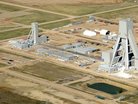BHP to invest $4.9bn in stage two of Jansen Stage 2

The announcement follows BHP’s approval of US$5.7bn (C$7.5bn) for Jansen Stage 1 in August 2021 and a pre-Jansen Stage 1 investment of US$4.5bn (C$4.9bn). BHP Chief Executive Officer, Mike Henry said: “This is an important milestone that underscores our confidence in potash and marks the next phase of the company’s growth in Canada. We believe Jansen will deliver long-term value for shareholders and the local community, and will position BHP as one of the leaders in the global potash industry.
Stage two investment
The stage two investment advances BHP’s strategy to increase its exposure to commodities positively leveraged to the global megatrends of population growth, urbanisation, rising living standards and decarbonisation. Potash, used in fertilisers, will be essential for food security and more sustainable farming.
Today’s additional investment will transform Jansen into one of the world’s largest potash mines, doubling production capacity to approximately 8.5m tonnes per annum (mtpa).We are advancing our sustainability and economic development priorities for Jansen and we are pleased with the progress of our ongoing work with the Governments of Canada and Saskatchewan, as well as local and Indigenous communities on shared solutions.”
Social and environmental value
Jansen Stage 1 is 32% complete and progressing in line with its schedule. First production from Jansen Stage 1 is expected to be delivered in late CY2026. Construction of Jansen Stage 2 is anticipated to take approximately six years, and is expected to deliver first production in FY2029, followed by a ramp up period of three years. It is expected to deliver approximately 4.36mtpa of production at a capital intensity of approximately US$1,050/t, lower than Jansen Stage 1, due to the leveraging of existing and planned infrastructure. In October 2022, BHP approved an initial funding commitment of US$188m to procure long lead equipment and commence process plant foundation works. The additional US$4.9bn investment for Jansen Stage 2 will be used for the development of additional mining districts, completion of the second shaft hoist infrastructure to handle higher mining volumes, expansion of processing facilities and the addition of more rail cars.
Westshore Terminals, in Delta, British Columbia, remains BHP’s main port facility to ship potash from Jansen to customers. The Jansen Stage 2 investment includes funding to increase storage facilities at the port. BHP will not be initiating a formal capacity extension for the Westshore port terminal at this time and will evaluate closer to Jansen Stage 2 reaching first production.
Jansen has been designed with a focus on social value and sustainability and is expected to have approximately 50% less operational (Scopes 1 and 2) greenhouse gas emissions per tonne of product and use up to 60% less fresh water when compared to the average potash mine in Saskatchewan. Indigenous employee representation at Jansen has increased to approximately 9% with a target to increase Indigenous employee representation at Jansen to 20%. Jansen aspires to maintain a gender balanced workforce.
Jansen Stage 2 was evaluated utilising BHP’s Capital Allocation Framework and at consensus prices has an internal rate of return of 15% to 18% and an expected payback period of approximately six years from first production. Underlying EBITDA margins for Jansen Stage 1 and Stage 2 of approximately 65% to 70% are expected due to a low-cost position of US$105 to120/t.
Transitioning to Jansen Stage 2 during the construction period of Jansen Stage 1 is expected to bring a number of operational benefits. These include leveraging the experience of the integrated Jansen project team, continued use of existing contractors, reduced overheads and savings on mobilisation and demobilisation costs. Potential synergies of US$0.3bn have been embedded into Jansen Stage 2's economics.
Longer term, Jansen has the potential for two additional expansions to reach an ultimate production capacity of 16 to 17mtpa (subject to studies and approvals).
